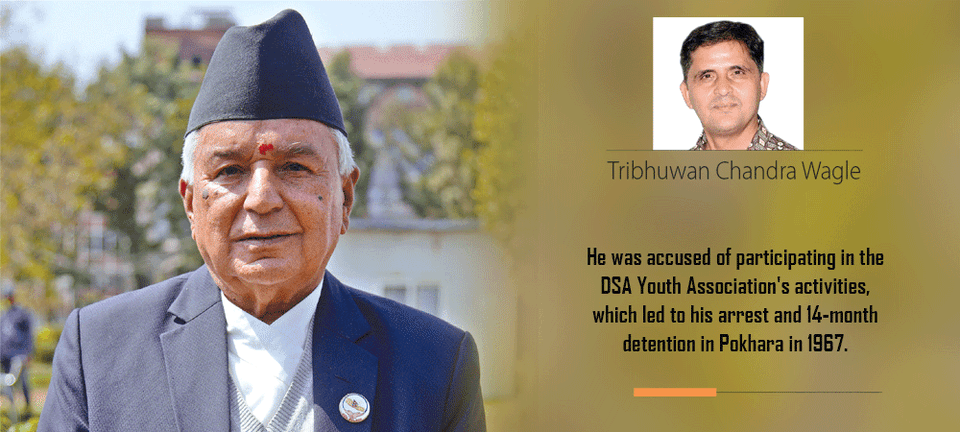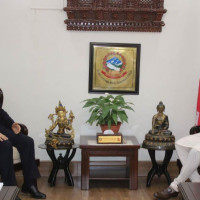- Thursday, 26 February 2026
Ram Chandra Paudel
From Prison To Presidency
The Federal Democratic Republic of Nepal elected veteran politician Ram Chandra Paudel, who comes from a middle-class farming family, as its third president. This triumph is a source of pride for all of Nepal's peasants, workers, and marginalised citizens as well as for Paudel, his party, the Nepali Congress (NC), and the eight-party alliance. Paudel is renowned as a tireless political explorer who, after a six-decade journey, attained the summit by becoming the head of the state. Due to his distinctive traits and individuality, which helped him stand apart from others in Nepali politics, he has maintained a place in many Nepalis' hearts during his long career.
Political Career
When Paudel was 15 years old, the first elected government of BP Koirala and the parliament were overthrown by the then-King Mahendra. Young Paudel was inspired to join the political movement that was opposing the king's actions and calling for the return of democracy. Before that, Paudel was involved in his public career as the founding secretary of Himalayan Chhatra Sangh (the Himalayan Students' Union) in Pokhara. From 1960 to 1967, he held several positions in student union organisations, including those of secretary, chair and executive member.
As general secretary of the Nepal Sanskrit Students Association and participant in the Kathmandu conference in 1962, he took the lead in the student movement. In 1966, Paudel served as the founding president of Gandaki Chhatra Sangh, the venue for the Gandaki Students' Union. He was the Democratic Socialist Youth League's founder and general secretary (1967).
Date of Birth: 14 Oct 1944
Mother: Hrishimaya Paudel
Father: Durga Prasad Paudel
Place of Birth: Tanahun District, Mirlung, Bahunpokhara, Presently Vyas Municipality–8 Risti
Permanent residence: Vyas-2 Damauli, Amarapuri
Current Residence: Boharatar, Balaju Height, Kathmandu.
Family status: Middle-class agrarian family
Wife: Sabita Paudel
Daughter: 4 (Sharmila, Sangyan, Anugyan, Abagyan)
Son: 1 (Chintan Paudel)
Education
SLC: Nandiratri Secondary School, Naxal Kathmandu, 1963
Intermediate in the Arts: Saraswati College, Kathmandu, 1966
Bachelors in Sanskrit (Shastri): Valmiki College Kathmandu, 1967
Masters in Arts: Tribhuvan University, 1970
He was also actively involved in the Jayatu Sanskritam Aandolan, a Kathmandu-based campaign for social reform, truth, and justice. With the Nandiratri Students' Union, Ranipokhari Madhyamik Bidhyalaya Students' Union, and other student unions, he took a prominent part in the student movement (1958–1967).
Students from 22 different schools convened at Judhodaya High School to spearhead the campaign calling for an independent student union. Under Poudel's direction, Nandiratri Mavi Vidyarthi Sangh and Ranipokhari Mavi Vidyarthi Sangh
were founded.
Continuity In Politics
Paudel started his political career in 1966 when he was chosen to the faculty of Saraswati College. He was a founding member of the Nepal Students' Union, which became the most well-known student group in the nation in 1970. The Nepal Students' Union is an umbrella group for democratic students in the nation and has occasionally served as the leader of several student movements in Nepal. In 1976, he was appointed district member for the Tanahu Nepali Congress; in 1978, he began serving the party as the district vice president. Before the start of the 1979 referendum, he actively served as head of the Committee to Popularise the Multi-Party System in Tanahun.
In 1983, he was chosen for the first time as a central member of the Nepali Congress while also serving as the coordinator of the NC's central committee for publicity. He has prior experience serving as the Vice President of the Party's Central Committee, and in 2015, he headed the NC as its acting president, where he played a key role in the party's 13th general convention's successful conclusion. Before being elected as President, he served as the party's "Senior Leader" and was in charge of the party.
Prison Life
He was held and arrested several times during the 30 years of Panchayat rule. He was jailed for a total of 14 years for having his connection with the banned NC, for being an opponent of the Panchayat, and for being the head of the free students' association. He saw glimpses of promise through the jail's little window and devoted his life to defending democratic causes and values.
For the first time, he was kept in jail for about a month in Kathmandu in 1962 after being arrested on suspicion of aiding in the armed takeover of Bharatpur by the Nepali Congress. Similarly, he was imprisoned for a year for his involvement in the Kathmandu student movement, and in 1964, while protesting the dismissal of the Nepal Police's then-DIG, he was also given a term of around six months in prison.
He was accused of participating in the DSA Youth Association's activities, which led to his arrest and 14-month detention in Pokhara in 1967. He was caught the next year participating in DSU operations in the western area and was once more imprisoned in Kathmandu for a whole year. He was found guilty of organising and launching the Nepal Student Union in 1970 and given a three-month jail sentence in Kathmandu. He participated in numerous student movement actions while incarcerated for 4 years, from 1971 to 1975, following the release of ousted prime minister BP Koirala from Sundarijal Prison.
For taking part in a protest programme against the Ramailo Jhoda scandal (Morong), which was staged at Kirtipur University, Paudel was imprisoned for 4 years, from 1971 to 1975. When the police opened fire to evict the squatters who were residing in a location known as Ramailo Jhoda in Morang, some of the squatters died.
After participating in the 1977 Patna Conference of the Nepali Congress, he was detained and held in prison for 10 months. As a result of the Patna convention, the Congress decided to start a satyagraha movement to abolish Panchayat and bring back democracy. In 1979, he actively contributed to the establishment of multi-party systems in the then referendum but was arrested and jailed for six months.
He was incarcerated for six months in 1981 after being arrested on suspicion of taking part in the boycott of the Panchayat elections at the national, district, and village/town levels. The Nepali Congress has decided to abstain from these polls. Due to allegations that he participated in the second campaign of disobedience (Satyagraha), leader Paudel was detained and given a 9-month jail sentence. The Nepali Congress launched the Satyagraha movement in 1985 to abolish Panchayat and reinstate multiparty democracy.
He was held in custody for three months in 1988 on suspicion of breaking the Printing Press and Publication Act after publishing organisational information of organisational activities and information of various departments of Nepali Congress. After the former King assumed his direct rule in 2001, Paudel was placed under house arrest until 2002. He was put under home detention and arrested many times during the second People's Movement in 2006 against the King’s autocratic rule.
Contribution and Success
Since the restoration of democracy, he has been elected six times as a member of the House of Representatives and the Constituent Assembly, from 1991 to 2022. On May 1, 1991, he, for the very first time, became a cabinet minister when he was named Minister of Local Development. After that, he gained experience working in several ministries, including those for the home, agriculture, communication, irrigation and water resources, education, peace, and rebuilding as a minister or deputy prime minister. In December 1994, he was chosen to serve as Speaker of the House. He has received many human rights-related honours. The Japanese government honoured him with its official state accolade known as the "Order of the Rising Sun" in 2020. He was honoured with Mahendra Vikram Shah Award. Shah, a former minister, had founded the Nepal Prajatantra Congress.
Unique Identity
Paudel is regarded as a socialist theorist and practitioner as he leads a simple lifestyle with lofty ideas. He has a good reputation as a leader with a simple lifestyle. Renowned for being an articulate educator and speaker on democratic socialism, he is well-known as a coordinator and moderate leader within the Nepali Congress. He enjoyed a pivotal position in the historic dialogue and agreement to integrate the rebel Maoists into mainstream politics.
He is credited with writing the Comprehensive Peace Accord and the 12-Point Agreement that ended the decade-long violent Maoist uprising, paving the path for Maoist integration into peaceful politics.
Paudel As A Writer
Matching his career as an experienced leader who participated in various political events, Paudel has written several books. A Brief History of Nepali Congress (Nepali Congress Ko Sankshipta Itihas), Democratic Socialism A Study (Prajatantrik Samajwad: Ek Adhyayan), What Does The Nepali Congress Say? (Nepali Congress ke Bhanchha?), Journey of Faith: Political Analysis (Aastha Ko Yatra: Rajnitik Bishleshan), Agrarian Revolution and Socialism (Krishi Kranti Ra Samajwad), Ways of Transformation to Nepali Congress (Nepali Congres Ko Rupantaran Marg) are some of the popular books penned by the veteran politician.
(Wagle is a journalist at Gorkhapatra Corporation)










-original-thumb.jpg)




-original-thumb.jpg)